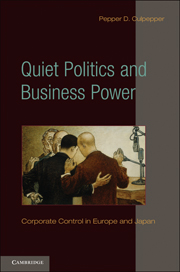Book contents
- Frontmatter
- Contents
- Tables and Figures
- Abbreviations
- Preface
- 1 Corporate Control and Political Salience
- 2 Patient Capital and Markets for Corporate Control
- 3 The Managerial Origins of Institutional Divergence in France and Germany
- 4 The Netherlands and the Myth of the Corporatist Coalition
- 5 Managers, Bureaucrats, and Institutional Change in Japan
- 6 The Noisy Politics of Executive Pay
- 7 Business Power and Democratic Politics
- Bibliography
- Index
1 - Corporate Control and Political Salience
Published online by Cambridge University Press: 05 June 2012
- Frontmatter
- Contents
- Tables and Figures
- Abbreviations
- Preface
- 1 Corporate Control and Political Salience
- 2 Patient Capital and Markets for Corporate Control
- 3 The Managerial Origins of Institutional Divergence in France and Germany
- 4 The Netherlands and the Myth of the Corporatist Coalition
- 5 Managers, Bureaucrats, and Institutional Change in Japan
- 6 The Noisy Politics of Executive Pay
- 7 Business Power and Democratic Politics
- Bibliography
- Index
Summary
The hostile takeover is the signature act of no-holds-barred capitalism. While discussions of friendly mergers between companies are conducted in the language of cooperation and synergy, the discourse around unfriendly takeovers is replete with metaphors of war and violent conflict. The assets of conquered companies are treated as the spoils of war: the losing firm can be ransacked, reorganized, or liquidated, with grim consequences for its employees. Companies themselves are the site of many political compromises over fundamental issues such as wages, health care, and pensions. Hostile takeovers disrupt these compromises. After takeovers, companies become bundles of assets like any other, with some parts disposed of to pay off debts and others sloughed off in the name of strategic reorientation. The willingness of a state to allow hostile takeovers is therefore of no small political import.
In the United States and the United Kingdom, hostile takeovers are considered business as usual. These economies, where companies freely change hands, are described as having “active” markets for corporate control. In contrast, the coordinated market economies of continental Europe and Japan long opted for what are called “passive” markets for corporate control, in which hostile takeovers were extremely rare. In these countries, political and business leaders colluded to prevent large companies from being treated as simple commodities. At the beginning of the 1990s, as the implications of global financial liberalization were becoming clear, Michel Albert warned his fellow Europeans of the fundamentally different role of the company in an economy with an active market for corporate control:
Buying a company, for the American capitalist, is no different from buying a property or a painting. It is therefore perfectly logical for the shareholder-kings to do as they please with the company they have just purchased, breaking it up and selling off the segments which do not interest them.
Over the past two decades, the deregulation of capital markets around the world has challenged the institutional arrangements that formerly impeded hostile takeovers in Europe and Japan. Large companies have been forced to concentrate on ensuring a satisfactory rate of return for increasingly demanding shareholders. Foreign investors, particularly Anglo-American pension and hedge funds, have raised their ownership stakes in many domestic markets, demanding in return political and firm-level reforms to improve corporate performance. These investors come with the promise of cheap and abundant capital, but there is a price. If investors are not satisfied with the performance of the existing management team, they may choose to sell their stakes to a bidder promising to make better use of the company's assets. Given the pressures of financial markets and the political demands of activist investors, many scholars predict the death of national models of capitalism.
- Type
- Chapter
- Information
- Quiet Politics and Business PowerCorporate Control in Europe and Japan, pp. 1 - 24Publisher: Cambridge University PressPrint publication year: 2010



